Communism
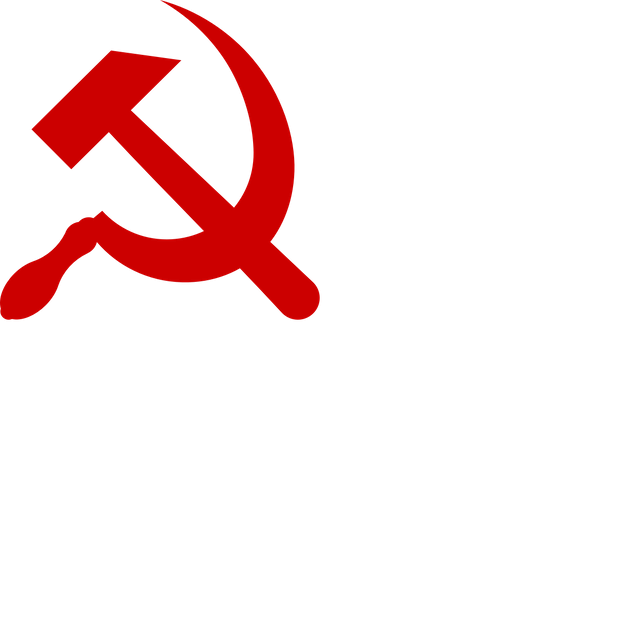
Communism

In political and social sciences, communism (from Latin communis, "common, universal")[1][2] is the philosophical, social, political, and economic ideology and movement whose ultimate goal is the establishment of the communist society, which is a socioeconomic order structured upon the common ownership of the means of production and the absence of social classes, money,[3][4] and the state.[4][6]
Communism includes a variety of schools of thought, which broadly include Marxism and anarchism (anarcho-communism), as well as the political ideologies grouped around both. All of these share the analysis that the current order of society stems from its economic system, capitalism; that in this system there are two major social classes; that conflict between these two classes is the root of all problems in society;[7] and that this situation will ultimately be resolved through a social revolution. The two classes are the working class—who must work to survive and who make up the majority within society—and the capitalist class—a minority who derives profit from employing the working class through private ownership of the means of production. The revolution will put the working class in power and in turn establish social ownership of the means of production, which according to this analysis is the primary element in the transformation of society towards communism. Critics of communism can be roughly divided into those concerning themselves with the practical aspects of 20th century communist states[8] and those concerning themselves with communist principles and theory.[9]
History
Early communism

Pierre-Joseph Proudhon, theoretician of libertarian socialism
According to Richard Pipes, the idea of a classless, egalitarian society first emerged in Ancient Greece.[10] The 5th-century Mazdak movement in Persia (Iran) has been described as "communistic" for challenging the enormous privileges of the noble classes and the clergy, for criticizing the institution of private property and for striving to create an egalitarian society.[11][12] At one time or another, various small communist communities existed, generally under the inspiration of Scripture.[13] For example, in the medieval Christian Church some monastic communities and religious orders shared their land and their other property (see religious and Christian communism).
Communist thought has also been traced back to the works of the 16th-century English writer Thomas More. In his treatise Utopia (1516), More portrayed a society based on common ownership of property, whose rulers administered it through the application of reason. In the 17th century, communist thought surfaced again in England, where a Puritan religious group known as the "Diggers" advocated the abolition of private ownership of land.[14] In his 1895 Cromwell and Communism,[15] Eduard Bernstein argued that several groups during the English Civil War (especially the Diggers) espoused clear communistic, agrarian ideals and that Oliver Cromwell's attitude towards these groups was at best ambivalent and often hostile.[15] Criticism of the idea of private property continued into the Age of Enlightenment of the 18th century through such thinkers as Jean Jacques Rousseau in France. Later, following the upheaval of the French Revolution communism emerged as a political doctrine.[16]
In the early 19th century, various social reformers founded communities based on common ownership.
However, unlike many previous communist communities they replaced the religious emphasis with a rational and philanthropic basis.[17] Notable among them were Robert Owen, who founded New Harmony in Indiana (1825), as well as Charles Fourier, whose followers organized other settlements in the United States such as Brook Farm (1841–1847).[17]
In its modern form, communism grew out of the socialist movement in 19th-century Europe. As the Industrial Revolution advanced, socialist critics blamed capitalism for the misery of the proletariat—a new class of urban factory workers who labored under often-hazardous conditions. Foremost among these critics were Karl Marx and his associate Friedrich Engels. In 1848, Marx and Engels offered a new definition of communism and popularized the term in their famous pamphlet The Communist Manifesto.[17]
Communism in the Soviet Union

The Russian SFSR as a part of the USSR in 1922
The 1917 October Revolution in Russia set the conditions for the rise to state power of Vladimir Lenin's Bolsheviks, which was the first time any avowedly communist party reached that position. The revolution transferred power to the All-Russian Congress of Soviets, in which the Bolsheviks had a majority.[18][19]*.%20Jerry%20F.%20Hough]]*within the Marxist movement. Marx predicted that socialism and communism would be built upon foundations laid by the most advanced capitalist development. However, Russia was one of the poorest countries in Europe with an enormous, largely illiterate peasantry and a minority of industrial workers. Marx had explicitly stated that Russia might be able to skip the stage of bourgeois rule.[21]
The moderate Mensheviks (minority) opposed Lenin's Bolshevik (majority) plan for socialist revolution before capitalism was more fully developed. The Bolsheviks' successful rise to power was based upon the slogans such as "Peace, bread and land" which tapped into the massive public desire for an end to Russian involvement in the First World War, the peasants' demand for land reform, and popular support for the soviets.[22] The Soviet Union was established in 1922.
Following Lenin's democratic centralism, the Leninist parties were organized on a hierarchical basis, with active cells of members as the broad base. They were made up only of elite cadres approved by higher members of the party as being reliable and completely subject to party discipline.[23] In the Moscow Trials, many old Bolsheviks who had played prominent roles during the Russian Revolution of 1917 or in Lenin's Soviet government afterwards, including Kamenev, Zinoviev, Rykov and Bukharin, were accused, pleaded guilty of conspiracy against the Soviet Union, and were executed.[24]
Cold War
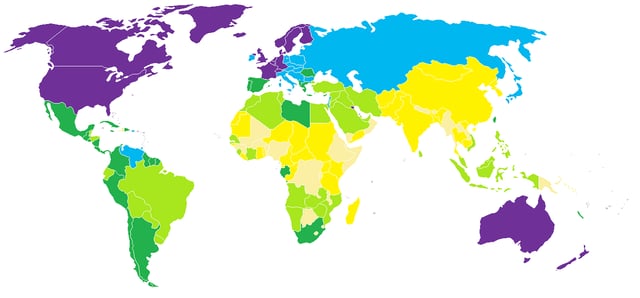
Countries by GDP (nominal) per capita in 1965 based on a West German school book (1971) > 5,000 DM 2,500–5,000 DM 1,000–2,500 DM 500–1,000 DM 250–500 DM < 250 DM
Its leading role in the Second World War saw the emergence of the Soviet Union as a superpower, with strong influence over Eastern Europe and parts of Asia. The European and Japanese empires were shattered and communist parties played a leading role in many independence movements. Marxist–Leninist governments modeled on the Soviet Union took power with Soviet assistance in Bulgaria, Czechoslovakia, East Germany, Poland, Hungary and Romania. A Marxist–Leninist government was also created under Marshal Tito in Yugoslavia, but Tito's independent policies led to the expulsion of Yugoslavia from the Cominform which had replaced the Comintern and Titoism was branded "deviationist". Albania also became an independent Marxist–Leninist state after World War II.[25] Communism was seen as a rival of and a threat to western capitalism for most of the 20th century.[26]
Dissolution of the Soviet Union
The Soviet Union was dissolved on December 26, 1991.
It was a result of the declaration number 142-Н of the Soviet of the Republics of the Supreme Soviet of the Soviet Union.[27] The declaration acknowledged the independence of the former Soviet republics and created the Commonwealth of Independent States, although five of the signatories ratified it much later or did not do it at all. On the previous day, Soviet President Mikhail Gorbachev (the eighth and final leader of the Soviet Union) resigned, declared his office extinct and handed over its powers – including control of the Soviet nuclear missile launching codes – to Russian President Boris Yeltsin. That evening at 7:32, the Soviet flag was lowered from the Kremlin for the last time and replaced with the pre-revolutionary Russian flag.[28]
Previously, from August to December all the individual republics, including Russia itself, had seceded from the union.
The week before the union's formal dissolution, eleven republics signed the Alma-Ata Protocol formally establishing the Commonwealth of Independent States and declaring that the Soviet Union had ceased to exist.[29][28]
Present situation

Countries of the world now (red) or previously (orange) having nominally Marxist–Leninist governments
At present, states controlled by Marxist–Leninist parties under a single-party system include the People's Republic of China, Cuba, Laos, and Vietnam. North Korea currently refers to its leading ideology as Juche, which is portrayed as a development of Marxism–Leninism. Communist parties, or their descendant parties, remain politically important in a number of other countries. The South African Communist Party is a partner in the African National Congress-led government. In India, as of March 2018, communists lead the government of only one state, Kerala. In Nepal, communists hold a majority in the parliament.[31] The Communist Party of Brazil was a part of the parliamentary coalition led by the ruling democratic socialist Workers' Party until August 2016.
The People's Republic of China has reassessed many aspects of the Maoist legacy and along with Laos, Vietnam and to a lesser degree Cuba has decentralized state control of the economy in order to stimulate growth.
Chinese economic reforms were started in 1978 under the leadership of Deng Xiaoping and since then China has managed to bring down the poverty rate from 53% in the Mao era to just 6% in 2001.[32] These reforms are sometimes described by outside commentators as a regression to capitalism, but the communist parties describe it as a necessary adjustment to existing realities in the post-Soviet world in order to maximize industrial productive capacity. In these countries, the land is a universal public monopoly administered by the state, as are natural resources and vital industries and services. The public sector is the dominant sector in these economies and the state plays a central role in coordinating economic development.
Marxist communism
Marxism
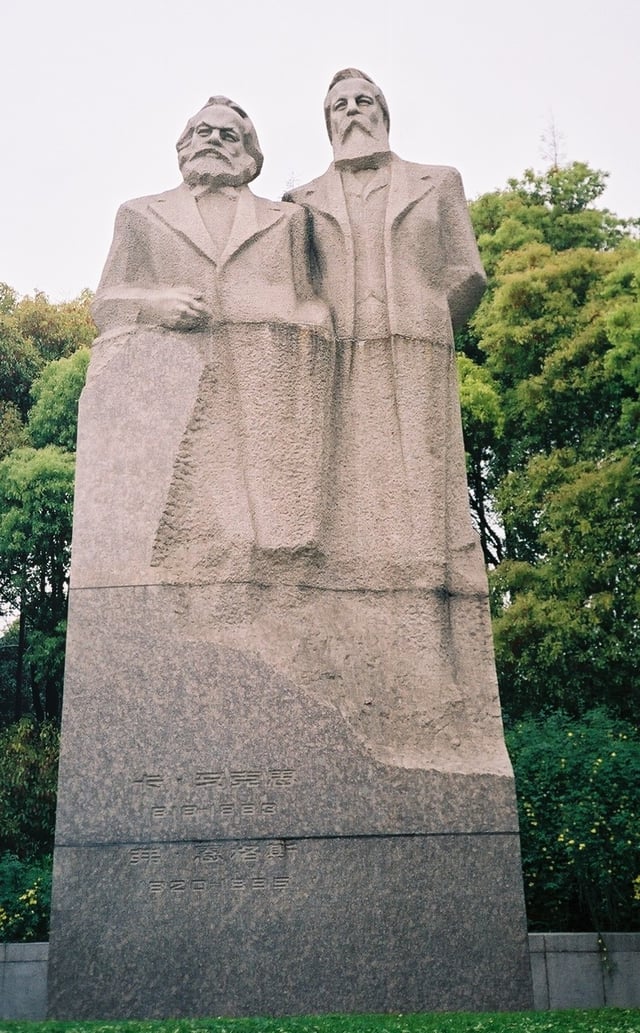
A monument dedicated to Karl Marx (left) and Friedrich Engels (right) in Shanghai, China
Marxism, first developed by Karl Marx and Friedrich Engels in the mid-1800s, has been the foremost ideology of the communist movement. Marxism considers itself to be the embodiment of scientific socialism, and rather than model an "ideal society" based on intellectuals' design, it is a non-idealist attempt at the understanding of society and history through an analysis based in real life. Marxism does not see communism as a "state of affairs" to be established, but rather as the expression of a real movement, with parameters which are derived completely from real life and not based on any intelligent design.[33] Therefore, Marxism does no blueprinting of a communist society and it only makes an analysis which concludes what will trigger its implementation and discovers its fundamental characteristics based on the derivation of real life conditions.
At the root of Marxism is the materialist conception of history, known as historical materialism for short. It holds that the key characteristic of economic systems through history has been the mode of production and that the change between modes of production has been triggered by class struggle. According to this analysis, the Industrial Revolution ushered the world into a new mode of production: capitalism. Before capitalism, certain working classes had ownership of instruments utilized in production, but because machinery was much more efficient this property became worthless and the mass majority of workers could only survive by selling their labor, working through making use of someone else's machinery and therefore making someone else profit. Thus with capitalism the world was divided between two major classes: the proletariat and the bourgeoisie.[34] These classes are directly antagonistic: the bourgeoisie has private ownership of the means of production and earns a profit off surplus value, which is generated by the proletariat, whom has no ownership of the means of production and therefore no option but to sell its labor to the bourgeoisie.
Historical materialism goes on and says: the rising bourgeoisie within feudalism, through the furtherance of its own material interests, captured power and abolished, of all relations of private property, only the feudal privileges and with this took out of existence the feudal ruling class.
This was another of the keys behind the consolidation of capitalism as the new mode of production, which is the final expression of class and property relations and also has led into a massive expansion of production.
It is therefore only in capitalism that private property in itself can be abolished.[34] Similarly, the proletariat will capture political power, abolish bourgeois property through the common ownership of the means of production, therefore abolishing the bourgeoisie and ultimately abolishing the proletariat itself and ushering the world into a new mode of production: communism.
In between capitalism and communism there is the dictatorship of the proletariat, a democratic state where the whole of the public authority is elected and recallable under the basis of universal suffrage.[36] It is the defeat of the bourgeois state, but not yet of the capitalist mode of production and at the same time the only element which places into the realm of possibility moving on from this mode of production.
An important concept in Marxism is socialization vs. nationalization.
Nationalization is merely state ownership of property, whereas socialization is actual control and management of property by society.
Marxism considers socialization its goal and considers nationalization a tactical issue, with state ownership still being in the realm of the capitalist mode of production; in the words of Engels: "[The transformation [...] into State-ownership does not do away with the capitalistic nature of the productive forces.
[...] State-ownership of the productive forces is not the solution of the conflict, but concealed within it are the technical conditions that form the elements of that solution".[37] This has led some Marxist groups and tendencies to label states such as the Soviet Union—based on nationalization—as state capitalist.[38]
Leninism
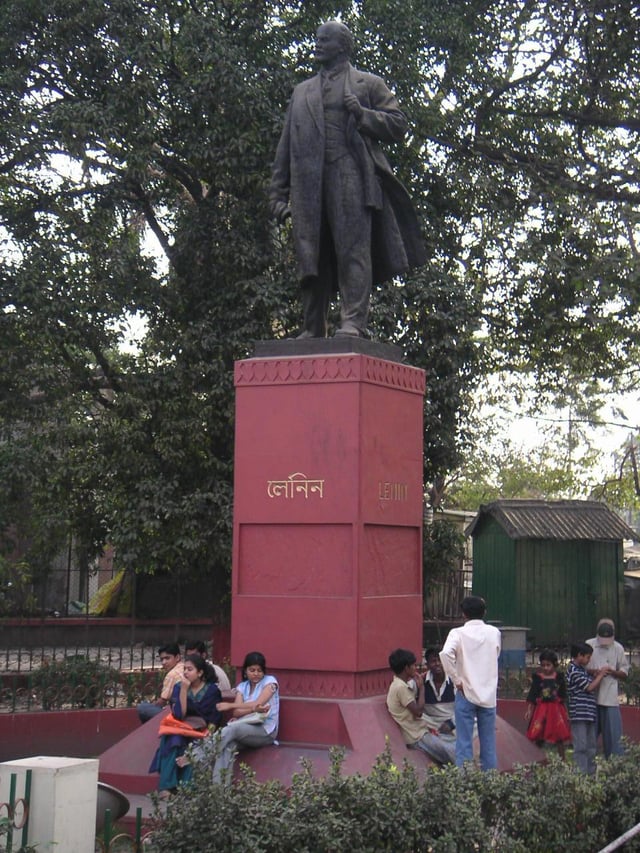
Vladimir Lenin's statue in Kolkata, West Bengal
We want to achieve a new and better order of society: in this new and better society there must be neither rich nor poor; all will have to work.
Not a handful of rich people, but all the working people must enjoy the fruits of their common labour.
Machines and other improvements must serve to ease the work of all and not to enable a few to grow rich at the expense of millions and tens of millions of people.
This new and better society is called socialist society.
The teachings about this society are called 'socialism'.–Vladimir Lenin, 1903[39]
Leninism is the body of political theory, developed by and named after the Russian revolutionary and later Soviet premier Vladimir Lenin for the democratic organisation of a revolutionary vanguard party and the achievement of a dictatorship of the proletariat, as political prelude to the establishment of socialism. Leninism comprises socialist political and economic theories developed from Marxism, as well as Lenin's interpretations of Marxist theory for practical application to the socio-political conditions of the agrarian early-twentieth-century Russian Empire. In February 1917, for five years Leninism was the Russian application of Marxist economics and political philosophy, effected and realised by the Bolsheviks, the vanguard party who led the fight for the political independence of the working class.
Trotskyism
Trotskyism is a Marxist and Leninist tendency that was developed by Leon Trotsky, opposed to Stalinism. It supports the theory of permanent revolution and world revolution instead of the two stage theory and socialism in one country. It supported proletarian internationalism and another communist revolution in the Soviet Union, which Trotsky claimed had become a "degenerated worker's state" under the leadership of Stalin, in which class relations had re-emerged in a new form, rather than the dictatorship of the proletariat.
Trotsky and his supporters, struggling against Stalin for power in the Soviet Union, organized into the Left Opposition and their platform became known as Trotskyism. Stalin eventually succeeded in gaining control of the Soviet regime and Trotskyist attempts to remove Stalin from power resulted in Trotsky's exile from the Soviet Union in 1929. While in exile, Trotsky continued his campaign against Stalin, founding in 1938 the Fourth International, a Trotskyist rival to the Comintern. In August 1940, Trotsky was assassinated in Mexico City on Stalin's orders.
Marxism–Leninism
Stalinism
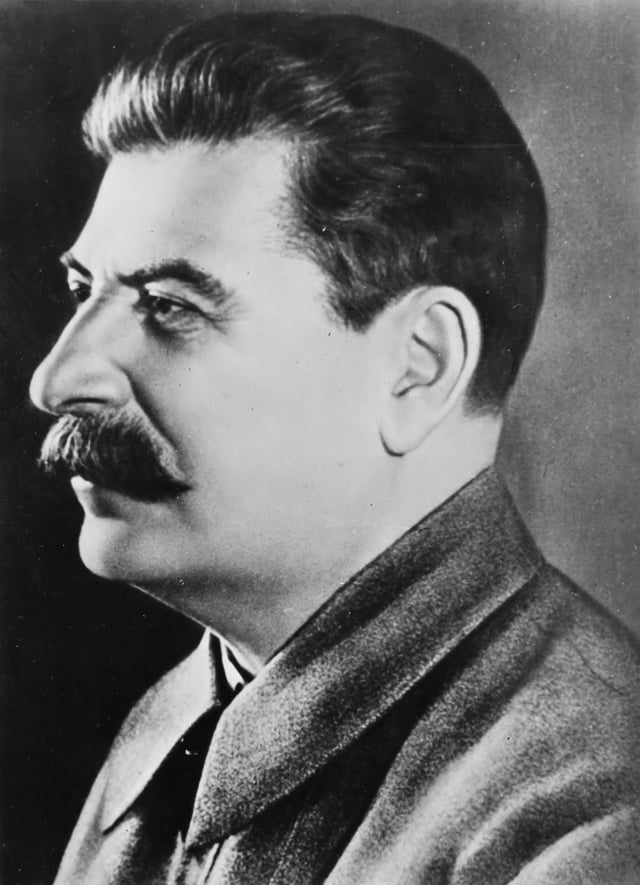
Joseph Stalin, 1942
Marxism–Leninism is a political ideology developed by Joseph Stalin,[40] which according to its proponents is based in Marxism and Leninism. The term describes the specific political ideology which Stalin implemented in the Communist Party of the Soviet Union and in a global scale in the Comintern. There is no definite agreement between historians of about whether Stalin actually followed the principles of Marx and Lenin.[41] It also contains aspects which according to some are deviations from Marxism, such as "socialism in one country".[42][43] Marxism–Leninism was the ideology of the most clearly visible communist movement. As such, it is the most prominent ideology associated with communism.
Marxism–Leninism refers to the socioeconomic system and political ideology implemented by Stalin in the Soviet Union and later copied by other states based on the Soviet model (central planning, one-party state and so on), whereas Stalinism refers to Stalin's style of governance. Marxism–Leninism stayed after de-Stalinization, Stalinism did not. In the last letters before his death, Lenin in fact warned against the danger of Stalin's personality and urged the Soviet government to replace him.[12]
Maoism is a form of Marxism–Leninism associated with Chinese leader Mao Zedong. After de-Stalinization, Marxism–Leninism was kept in the Soviet Union, but certain anti-revisionist tendencies such as Hoxhaism and Maoism argued that it was deviated from, therefore different policies were applied in Albania and China, which became more distanced from the Soviet Union.
Trotsky's politics differed sharply from those of Stalin and Mao, most importantly in declaring the need for an international proletarian revolution (rather than socialism in one country) and support for a true dictatorship of the proletariat based on democratic principles.
Marxism–Leninism has been criticized by other communist and Marxist tendencies.
They argue that Marxist–Leninist states did not establish socialism, but rather state capitalism.[38] According to Marxism, the dictatorship of the proletariat represents the rule of the majority (democracy) rather than of one party, to the extent that co-founder of Marxism Friedrich Engels described its "specific form" as the democratic republic.[45] Additionally, according to Engels state property by itself is private property of capitalist nature[46] unless the proletariat has control of political power, in which case it forms public property.[46] Whether the proletariat was actually in control of the Marxist–Leninist states is a matter of debate between Marxism–Leninism and other communist tendencies. To these tendencies, Marxism–Leninism is neither Marxism nor Leninism nor the union of both, but rather an artificial term created to justify Stalin's ideological distortion,[48] forced into the CPSU and Comintern. In the Soviet Union, this struggle against Marxism–Leninism was represented by Trotskyism, which describes itself as a Marxist and Leninist tendency.
Maoism

Chairman Mao statue in Shenyang, China
Maoism, known in China as Mao Zedong Thought, is a communist political theory derived from the teachings of the Chinese political leader Mao Zedong, whose followers are known as Maoists. Developed from the 1950s until the Deng Xiaoping reforms in the 1970s, it was widely applied as the guiding political and military ideology of the Communist Party of China and as theory guiding revolutionary movements around the world. A key difference between Maoism and other forms of Marxism–Leninism is that peasants should be the bulwark of the revolutionary energy,[49] led by the working class in China.
Libertarian Marxism
Libertarian Marxism is a broad range of economic and political philosophies that emphasize the anti-authoritarian aspects of Marxism. Early currents of libertarian Marxism, known as left communism,[50] emerged in opposition to Marxism–Leninism[51] and its derivatives, such as Stalinism, Maoism and Trotskyism.[52] Libertarian Marxism is also critical of reformist positions, such as those held by social democrats.[53] Libertarian Marxist currents often draw from Marx and Engels' later works, specifically the Grundrisse and The Civil War in France,[54] emphasizing the Marxist belief in the ability of the working class to forge its own destiny without the need for a revolutionary party or state to mediate or aid its liberation.[55] Along with anarchism, libertarian Marxism is one of the main currents of libertarian socialism.[56]
Libertarian Marxism includes such currents as Luxemburgism, council communism, left communism, Socialisme ou Barbarie, the Johnson-Forest tendency, world socialism, Lettrism/Situationism and operaismo/autonomism and New Left.[57] Libertarian Marxism has often had a strong influence on both post-left and social anarchists. Notable theorists of libertarian Marxism have included Anton Pannekoek, Raya Dunayevskaya, CLR James, Antonio Negri, Cornelius Castoriadis, Maurice Brinton, Guy Debord, Daniel Guérin, Ernesto Screpanti and Raoul Vaneigem.
Council communism
Council communism is a movement originating in Germany and the Netherlands in the 1920s. Its primary organization was the Communist Workers Party of Germany. Council communism continues today as a theoretical and activist position within both left-wing Marxism and libertarian socialism.
The central argument of council communism, in contrast to those of social democracy and Leninist communism, is that democratic workers' councils arising in the factories and municipalities are the natural form of working class organization and governmental power. This view is opposed to both the reformist and the Leninist ideologies, with their stress on respectively parliaments and institutional government (i.e. by applying social reforms on the one hand and vanguard parties and participative democratic centralism on the other).
The core principle of council communism is that the government and the economy should be managed by workers' councils composed of delegates elected at workplaces and recallable at any moment. As such, council communists oppose state-run authoritarian "state socialism"/"state capitalism". They also oppose the idea of a "revolutionary party", since council communists believe that a revolution led by a party will necessarily produce a party dictatorship. Council communists support a worker's democracy, which they want to produce through a federation of workers' councils.
Eurocommunism
Eurocommunism was a revisionist trend in the 1970s and 1980s within various Western European communist parties. They claimed to be developing a theory and practice of social transformation more relevant for Western Europe. During the Cold War, they sought to undermine the influence of the Soviet Union and the Communist Party of the Soviet Union. It was especially prominent in Italy, Spain and France.[58]
Left communism

Rosa Luxemburg
Left communism is the range of communist viewpoints held by the communist left, which criticizes the political ideas and practices espoused—particularly following the series of revolutions which brought the First World War to an end—by Bolsheviks and by social democrats. Left communists assert positions which they regard as more authentically Marxist and proletarian than the views of Marxism–Leninism espoused by the Communist International after its first congress (March 1919) and during its second congress (July–August 1920).[59]
Left communists represent a range of political movements distinct from Marxist–Leninists (whom they largely view as merely the left-wing of capital), from anarcho-communists (some of whom they consider internationalist socialists) as well as from various other revolutionary socialist tendencies (for example De Leonists, whom they tend to see as being internationalist socialists only in limited instances).[60]
Non-Marxist communism
The dominant forms of communism are based on Marxism, but non-Marxist versions of communism (such as Christian communism and anarcho-communism) also exist.
Anarcho-communism
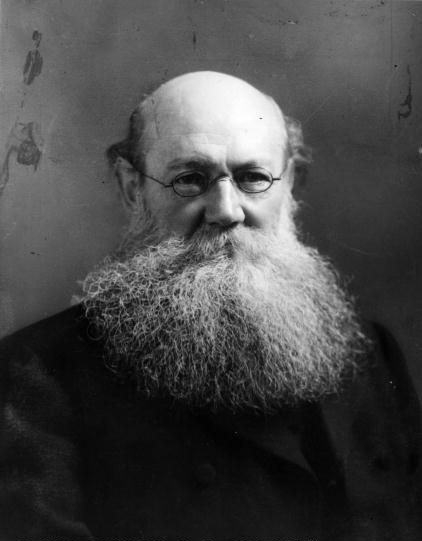
Peter Kropotkin, main theorist of anarcho-communism
Anarcho-communism (also known as libertarian communism) is a theory of anarchism which advocates the abolition of the state, private property and capitalism in favor of common ownership of the means of production,[61][62] direct democracy and a horizontal network of voluntary associations and workers' councils with production and consumption based on the guiding principle: "From each according to his ability, to each according to his need".[63][64]
Anarcho-communism differs from Marxism rejecting its view about the need for a state socialism phase before building communism.
The main theorist of anarcho-communism, Peter Kropotkin, argued that a revolutionary society should "transform itself immediately into a communist society", that is should go immediately into what Marx had regarded as the "more advanced, completed, phase of communism".[65] In this way, it tries to avoid the reappearance of "class divisions and the need for a state to oversee everything".[65]
Some forms of anarcho-communism such as insurrectionary anarchism are egoist and strongly influenced by radical individualism,[66][67][68] believing that anarchist communism does not require a communitarian nature at all. Most anarcho-communists view anarchist communism as a way of reconciling the opposition between the individual and society.[69][70][71]
To date in human history, the best-known examples of an anarcho-communist society, established around the ideas as they exist today and that received worldwide attention and knowledge in the historical canon, are the anarchist territories during the Spanish Revolution and the Free Territory during the Russian Revolution. Through the efforts and influence of the Spanish anarchists during the Spanish Revolution within the Spanish Civil War, starting in 1936 anarcho-communism existed in most of Aragon, parts of the Levante and Andalusia as well as in the stronghold of Anarchist Catalonia before being brutally crushed. During the Russian Revolution, anarchists such as Nestor Makhno worked to create and defend—through the Revolutionary Insurrectionary Army of Ukraine—anarcho-communism in the Free Territory of the Ukraine from 1919 before being conquered by the Bolsheviks in 1921.
Christian communism
Christian communism is a form of religious communism based on Christianity. It is a theological and political theory based upon the view that the teachings of Jesus Christ compel Christians to support communism as the ideal social system. Although there is no universal agreement on the exact date when Christian communism was founded, many Christian communists assert that evidence from the Bible suggests that the first Christians, including the Apostles, established their own small communist society in the years following Jesus' death and resurrection. As such, many advocates of Christian communism argue that it was taught by Jesus and practiced by the Apostles themselves.
Christian communism can be seen as a radical form of Christian socialism. Christian communists may or may not agree with various aspects of Marxism. They do not agree with the atheist and antireligious views held by secular Marxists, but they do agree with many of the economic and existential aspects of Marxist theory, such as the idea that capitalism exploits the working class by extracting surplus value from the workers in the form of profits and the idea that wage labor is a tool of human alienation that promotes arbitrary and unjust authority. Like Marxism, Christian communism also holds the view that capitalism encourages the negative aspects of humans, supplanting values such as mercy, kindness, justice and compassion in favor of greed, selfishness and blind ambition.
Criticism
Marxism is also subject to general criticisms, criticisms related to historical materialism that it is a type of historical determinism, the necessary suppression of liberal democratic rights, issues with the implementation of communism and economic issues such as the distortion or absence of price signals. In addition, empirical and epistemological problems are frequently identified.[73]A%20History%20of]] [75]
See also
American Communist History
Anti-communist mass killings
Communisme
Communism by country
Communist bandit
Communist party
List of communist parties
Mass killings under communist regimes
Post-scarcity economy
Sociocultural evolution
Twentieth Century Communism